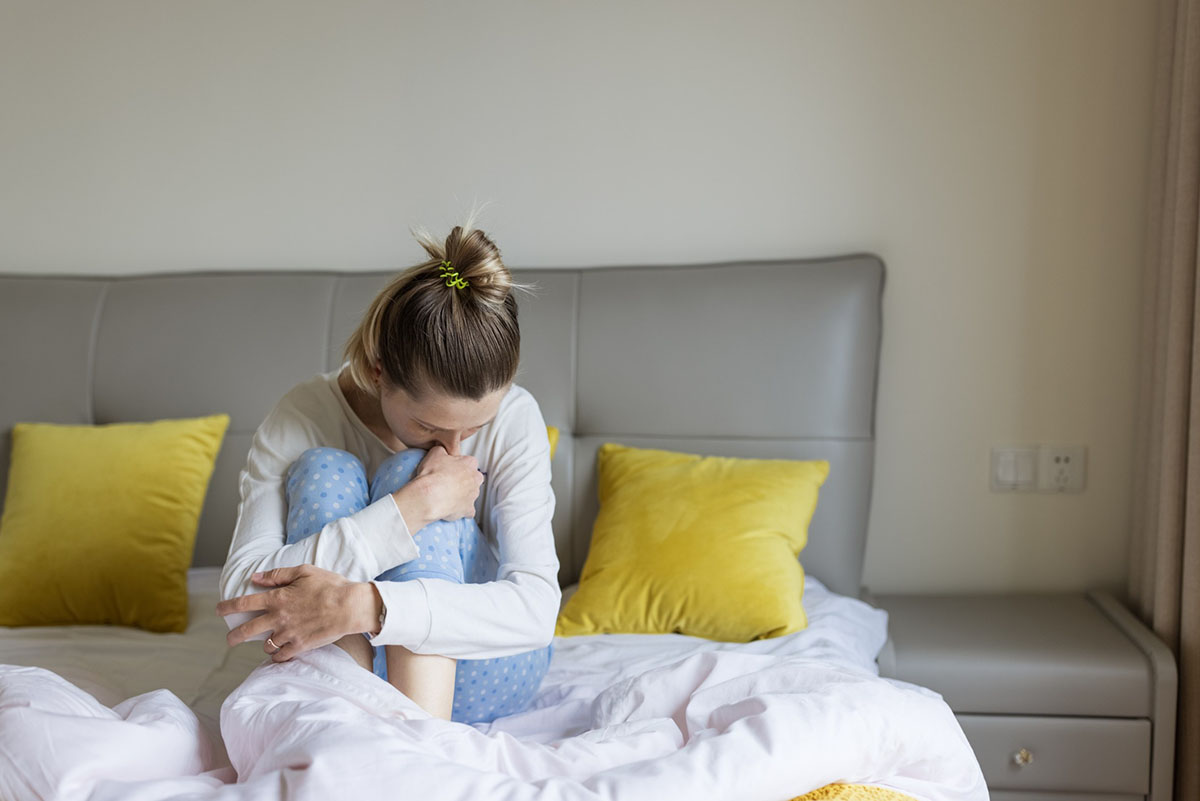Balancing a high-pressure career with our personal well-being is challenging enough—and for parents, there’s an…

Anxiety and Depression in Young Adults Keeps Rising. Here’s How To Support Your Child
We hear a lot about anxiety and depression for adults, but many people don’t realize just how these mental health issues impact young adults.
And that impact is significant – the rates of anxiety and depression in young adults have been rising for a long time. Between 2007 and 2012, for example, the estimated increase was as high as 20 percent1.
The COVID-19 pandemic has brought mental health into the forefront of the conversation, posing psychological challenges alongside the very real physical concerns of the virus2. And according to the Centers for Disease Control and Prevention, young adults have experienced the mental health consequences of the pandemic at disproportionate rates3.
Why Anxiety and Depression Are So Prevalent In Young Adults
So – why? Why is anxiety and depression so prevalent in young people?
Anxiety and depression can be caused by a lot of things: hormones, brain chemistry, trauma, or inherited patterns of negative thinking, for instance.
But our world can also just be scary. From a rise in public shootings to active shooter drills and lockdowns in schools, young people have legitimate fears to contend with. They also aren’t immune to feeling the impacts of our fractured political landscape; watching or reading the news, or even just hearing adults discuss current events can result in feelings of stress or anxiety.
Young adults today are constantly connected. The smartphones in their pockets mean they are inundated by various forms of media all day, every day, telling them how they should look, how to spend their time, what to like or dislike.
And these trends can change daily! That’s a lot of pressure to figure it all out and be unique – but also fit in, all at once.
There’s tremendous pressure on children, teens, and college-aged young people to perform to increased standards in a culture that prizes achievement and productivity like never before. Social media alone encourages the monetization of hobbies for young people, showing them how they can “brand” themselves and become influencers on TikTok or YouTube.
And these new pressures are layered on top of the old standbys, like hormonal changes, navigating relationships and social status, and keeping up academically and with extracurriculars.
Risk Factors for Anxiety and Depression in Young Adults
Specific risk factors for anxiety and depression in young adults include:
- Difficult home situations or family fractures;
- Witnessing or being victim to verbal, emotional, or physical abuse;
- Struggling with issues like learning disabilities that might decrease self-esteem or inspire bullying behavior from others;
- Experiencing other mental health issues like bipolar disorder or eating disorders;
- Chronic or repeated pain or fatigue;
- Acute or chronic illness like cancer, diabetes, or asthma; and
- Feeling unsupported or othered because of sexuality or gender expression.
Why We Need To Pay Attention
Chronic anxiety can lead to longer-term issues – more severe mental health problems, for example, like depression, substance abuse, and suicide. Anxiety can make it more difficult to concentrate on tasks, maintain relationships, and experience appropriate emotional growth.
It can also have physical manifestations like headaches or digestive problems, and it can have more serious physical ramifications down the road.
For these reasons and more, when signs of mental health struggles like anxiety and depression are present in young adults, they need to be taken seriously and addressed as quickly as possible.
Signs & Symptoms of Anxiety and Depression in Young Adults
Anxiety and depression cut across all demographics and aren’t uniform in their presentation – especially amongst young people.
But there are some common signs and symptoms of anxiety and depression in young adults. Pay attention if you notice the following in your child or loved one:
- New fears or worries about everyday life and normal activities
- Behavior changes like new or increasing irritability or sadness
- Fighting with friends
- Avoiding social interactions or activities
- A new loss of interest in or avoidance of school
- Falling grades or wanting to quit extracurricular activities
- Struggles with concentration and completing tasks
- Substance use or other risky behaviors
- Frustration or anger over small inconveniences or disappointments
- Feelings of hopelessness, worthlessness, or low self-esteem
- Heightened sensitivity to failure or perceived rejection
- Self-blame or criticism that seems out-of-line with the severity of an event or situation
- Frequent thoughts of death, dying, or suicide
Sleep disturbance like nightmares or insomnia can also be indicators, as can an increase in the amount of sleep a young person is getting. Remember, however, that teens need more sleep than adults4! Pay attention to significant changes or sudden shifts in behavior, rather than just the hours spent resting.
Physical complaints – pain or discomfort – can also be signs of anxiety and depression in young adults. Always seek medical guidance to rule out any illness or injury.
The signs and symptoms of anxiety can overlap with those of depression, and vice versa. Be on the lookout for changes in personality or behavior. They can often be subtle, and a young person won’t always be able to identify the ways in which they’re struggling.
Supporting Your Child’s Mental Health
If your child or young adult is struggling with anxiety or depression, it’s important to support them in healthy, effective ways.
Here’s where to start.
Talk To Your Child About Their Stressors
To address these issues, talk to your child about the potential stressors in their life – they’re young, but they do have stressors! Keep your expectations realistic for their developmental stage, and be supportive of their struggles.
Be mindful of the impact social media can have on young adults. Help them understand how to improve their media literacy so they can appropriately navigate all of the different messages they’re receiving online.
Model Healthy Behaviors
Young adults need time to rest, laugh, be silly with friends, and enjoy themselves – so model this good behavior for them! Help them find hobbies or other things to do that naturally encourage time away from screens and social media, for example.
Exercise can be exceptionally helpful for boosting serotonin and keeping mental health issues in check, so encourage your child to join you and get moving in ways that are fun! Remember, however, that depression can come with a persistent feeling of sadness and loss of interest in even once-loved activities; your child may not immediately jump at the suggestion to participate.
See a Clinical Psychologist
Seeking therapy is an important step. A clinical psychologist can support you and your child through the process of identifying and managing anxiety and depression.
There are several ways to treat anxiety and depression in young adults. Cognitive behavioral therapy (CBT) is a common and effective type of talk therapy that can be successful in the treatment of anxiety and depression. Medications like SSRIs are another possibility. Often, it’s a combination of these two things that helps the most.
Helping your young adult build coping skills means modeling them yourself, as much as possible. Don’t hesitate to seek the help of a qualified clinical psychologist for you and your child.
The clinical therapists at Amplify Wellness + Performance have years of experience working with young people and families around anxiety, depression, and sports or other high-performance lifestyles. Start the conversation today.
ENDNOTES


